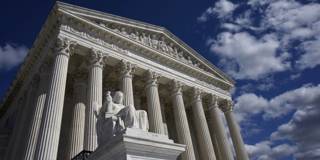Throughout US President Donald Trump's first term, there has been constant hand wringing over a "constitutional crisis" that never arrived. The irony is that an administration led by Joe Biden would almost certainly confront such a crisis, owing to Trump's transformation of the Supreme Court into a right-wing redoubt.
CHICAGO – Since Donald Trump’s election in 2016, legal academics like me have been bombarded with emails from journalists asking whether the United States is undergoing or heading for a “constitutional crisis.” Most of these queries have been motivated by the president’s norm-busting, including his interference with Special Counsel Robert Mueller’s investigation of Russian interference in the election, his verbal attacks on journalists and judges, and his efforts to launch investigations against his political opponents.
A constitutional crisis, properly understood as a turning point that might lead to collapse or transformation of the system, has not occurred. But such a crisis does now appear increasingly likely. I am not talking about the election (though that could produce a constitutional crisis if the outcome is close, or in the unlikely event that Trump somehow refuses to leave office). Rather, I am referring to a crisis that could occur even if Trump loses. This crisis would arise from a tension that has existed throughout American history: namely, between the courts and a system of democracy that gives ultimate power to the people.
There have been two constitutional crises in American history. Both of them involved a clash between the Supreme Court and elected officials backed by popular opinion. The first began with the infamous case of Dred Scott v. Sandford in 1857. In that case, the Supreme Court held that African-Americans were not citizens of the United States, and that the 1820 Missouri Compromise – which had staved off civil war by providing a formula for dividing territory between slave and free states – was unconstitutional.

CHICAGO – Since Donald Trump’s election in 2016, legal academics like me have been bombarded with emails from journalists asking whether the United States is undergoing or heading for a “constitutional crisis.” Most of these queries have been motivated by the president’s norm-busting, including his interference with Special Counsel Robert Mueller’s investigation of Russian interference in the election, his verbal attacks on journalists and judges, and his efforts to launch investigations against his political opponents.
A constitutional crisis, properly understood as a turning point that might lead to collapse or transformation of the system, has not occurred. But such a crisis does now appear increasingly likely. I am not talking about the election (though that could produce a constitutional crisis if the outcome is close, or in the unlikely event that Trump somehow refuses to leave office). Rather, I am referring to a crisis that could occur even if Trump loses. This crisis would arise from a tension that has existed throughout American history: namely, between the courts and a system of democracy that gives ultimate power to the people.
There have been two constitutional crises in American history. Both of them involved a clash between the Supreme Court and elected officials backed by popular opinion. The first began with the infamous case of Dred Scott v. Sandford in 1857. In that case, the Supreme Court held that African-Americans were not citizens of the United States, and that the 1820 Missouri Compromise – which had staved off civil war by providing a formula for dividing territory between slave and free states – was unconstitutional.